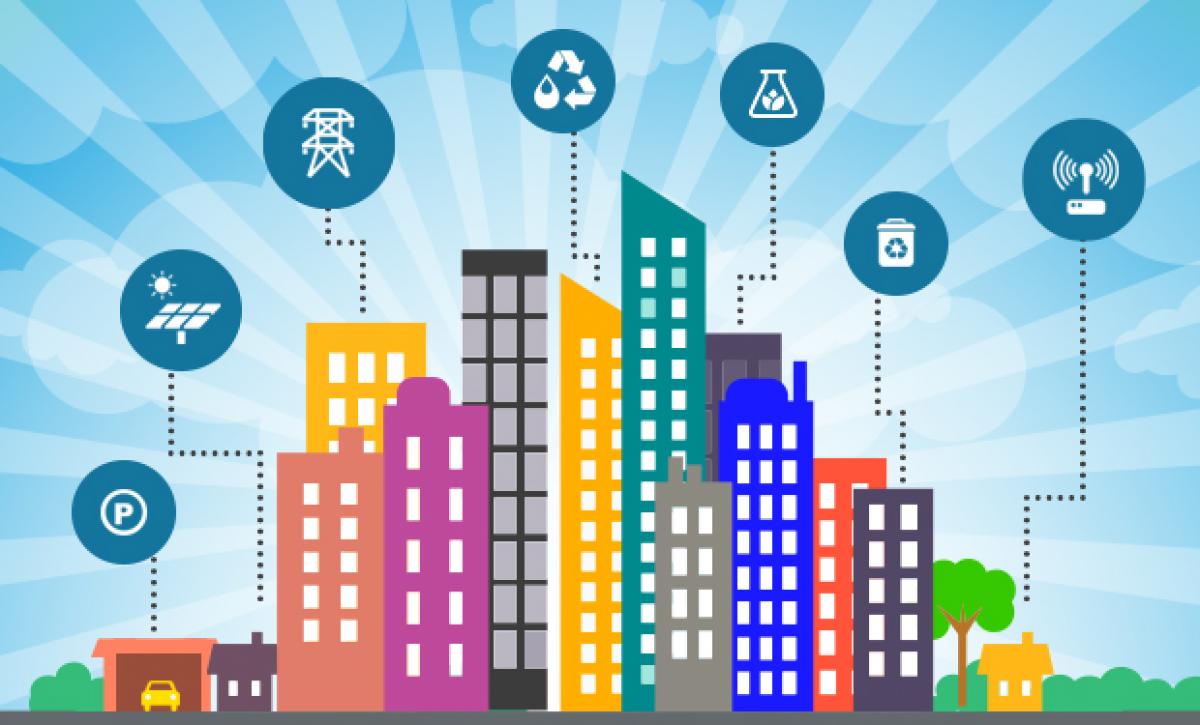Live
- Writ in HC seeking disqualification of BRS MLAs Venkata Rao Tellam, Kadiyam Srihari
- PM Modi Criticizes Congress Over Muslim Inclusion In Karnataka's OBC List
- Danam’s family owns total assets worth about Rs 58 cr
- DCA seizes medicines with misleading advertisements
- Naveen unveils BJD roadmap to make Odisha No.1 State
- Social media posts influence over 50% youngsters in city
- KCR is mentally imbalanced
- SWG pipe industry on verge of closure: State SWG pipe industry stares at grim future as orders dry up
- Visakhapatnam: YSRCP candidates file nominations amid fanfare
- Congress party finalises Lok Sabha candidates in AP, Telangana
Just In

Internet of Things (IoT) and Smart Cities are buzzwords for any technology company today because these domains will become the cash cows and the job hot job spots of the future.
Opportunities will go up in Analytics, machine-to-machine language and end user apps, says Ravinder Singh of Dell India
Internet of Things (IoT) and Smart Cities are buzzwords for any technology company today because these domains will become the cash cows and the job hot job spots of the future.
To know more, TechGig.com spoke to Ravinder Singh, director - solutions strategy & business development, IoT, Smart Cities & Digitisation, Dell India about how the IT job market will be impacted with IoT and ‘smart cities’. Excerpts:
You once said IoT is still far from becoming a reality. Why?
IoT is a big umbrella. There are some pockets where adoption is much faster – for example in Smart Cities, manufacturing and utilities. However, we still have to wait till we can see IoT implementations everywhere. The good thing is that the adoption rate is faster today than it was sometime back. The availability of solutions, systems and skill is becoming much easier today. In the next 3-4 years, we will see a higher rate of IoT adoption in developing countries like India than in developed markets.
Will talent in IoT grow by the same proportion as IoT industry?
IoT skills might grow even faster. Over the last few years, we have witnessed mushrooming of skill development around areas such as analytics, machine-to-machine (M2M) and end user apps which are the building blocks for IoT. Many universities and colleges are now offering courses around Smart Cities and M2M development. We are even seeing many startups are being setup around this technology as we speak.
Who all are eligible to get a job in IoT?
Well, IoT is a large concept which encompasses multiple domains and areas. I see opportunities for all kinds of talent and availability of jobs as we proceed. Some key areas of high interest will be data analytics, energy, M2M language, robotics & artificial intelligence (AI) and software development including apps creation.
What factors will help drive jobs in IoT?
Development of key skills, execution of IoT-based projects (many are still on concept stage) and adoption of IoT in multiple domains will drive jobs in this area. One of the key factors is government backing. Fortunately, the government of India is supporting large scale projects around Smart Cities, Make in India, Skill Development and Digital India through its progressive policies and campaigns, which have a huge IoT play. If this focus remains, we will see a whole new set of jobs emerging.
What roadblocks do you see in the IoT movement to grow further, particularly in India?
One factor for any such innovation to succeed is government support. The IT industry is a great example of how the government supported a new industry by providing all benefits and assistance (STPI, SEZ etc.) which helped India become an IT superpower. Similarly for IoT-based industries to grow, a lot of government backing and support is necessary. If this is not facilitated, we are stuck. Another critical roadblock can be availability of investment. As of now, we do see some major investments happening in this space. However, more is required. Lastly, adoption is a key factor and can hamper growth if we our key industries do not adopt to IoT faster.
What does ‘smart’ mean to a commoner, when we refer to smart technologies?
For a common man, ‘smart’ means making life easier - having a simple, reliable and cost-effective process which can be used by the common man without much effort, should give desired results in a time-bound manner and reduce overall cost. When we talk of smart cities or buildings, for a common man, it means technology-enabled processes that will help him to travel from point A to point B without hassle, obtain information without spending too much time and effort and have a better life without any concerns about security and higher costs.
Smart Cities are a new concept in India. When do you really see them coming in?
Smart Cities are here. I have seen this concept grow from a simple thought in the early 2000s, to the present day where we are witnessing the execution of at least 20 Smart Cities to begin with. In the next three years, another 60-80 cities will be added and we will see all of these in execution mode. If things go as per plan, we will see a real Smart City by 2018-19.
Is the concept of Smart Cities an opportunity for developers?
Absolutely. Smart Cities come with a lot of infrastructure development play. Roads, highways, buildings (both commercial and residential), large industrial parks etc. are going to be essential components of a Smart City, which offer a big play for developers. However, they need to also change and adopt global practices to sustain.
Diksha Gupta
Source: TechGig.com

© 2024 Hyderabad Media House Limited/The Hans India. All rights reserved. Powered by hocalwire.com







